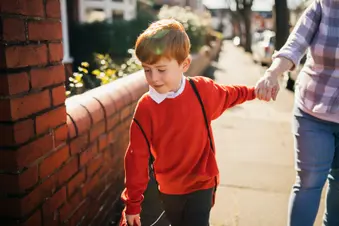
Puberty marks a big change in a child's life. It brings about not only physical changes like body hair, breasts, menstrual periods, and a deeper voice, but also emotional changes. Kids with central precocious puberty (CPP) go through these changes much sooner than their peers.
Going into puberty early can make kids feel different from their friends. It can lead to a whole range of physical, emotional, behavioral, and social problems.
Short Height
Kids who start puberty early have a quick growth spurt that makes them taller than their peers at first.
But because their bones mature earlier than usual, they stop growing sooner than they should. As a result, these kids may be shorter than average as adults.
Poor Body Image and Low Self-Esteem
Growing breasts or sprouting body hair before their friends can make kids feel self-conscious. It can be hard in elementary or middle school to look different from their peers.
Feeling different sometimes leads to low self-esteem. The sexual attention girls get because of their newly mature body can make them feel uncomfortable in their own skin.
Social Problems
Fitting in can be hard when kids look more mature than everyone else their age.
Early puberty makes some girls more nervous about getting into friendships with their peers who look much younger than them. In an attempt to fit in, they may hang out with older kids, who could introduce them to unhealthy habits like alcohol and tobacco use.
Depression and Anxiety
The flood of hormones that set off puberty can also make a child more moody. In girls, higher levels of the hormone estrogen make depression more likely. The stresses of going into puberty early can also create a lot of anxiety.
Starting puberty early doesn't give kids enough time to learn the coping skills they need to deal with depression and anxiety. And these problems sometimes last into early adulthood.
Behavior Problems
Early puberty makes some children act out. Kids may become more aggressive and get into trouble more often than they did before. Their friends might be one reason for these problem behaviors.
Children who mature early sometimes feel more comfortable hanging out with friends who are older and look more like them. But these older kids can be bad influences.
Peer pressure and behavior problems sometimes cause kids to get into trouble at school, or even to skip school.
Stress
It's stressful to look different from everyone else your age.
Stress is not only a result of early puberty. It's also a cause. Studies find that exposure to stress at a young age might make puberty come early. And in kids who do mature early, stress can make other complications, like depression and drug or alcohol use, more likely.
Sexual Behavior
Girls who go into puberty early look more mature than their peers, and they can attract more sexual attention than other girls their age. Hormone changes make both boys and girls feel the urge to have sex before they're emotionally ready for it.
Kids who start puberty early are more likely to have sex at an early age. Becoming sexually active too early can lead to unwanted pregnancy.
Substance Abuse
Kids who start puberty early are more likely than other kids their age to try drugs, cigarettes, and alcohol. One reason they experiment is because of pressure from older friends to act more mature than they are.
In boys, an early rush of testosterone speeds the development of brain areas that promote reward-seeking behaviors like drug and alcohol use. Meanwhile, parts of the brain that are involved in impulse control and decision-making aren't fully mature yet.
Using drugs and alcohol at an early age could set kids up for addiction problems that last into adulthood.
Eating Disorders
It's rare for young children to get eating disorders like anorexia or bulimia. The surge in hormones at puberty makes these conditions more likely to start. Early puberty can make eating disorders more likely.
Early warning signs that your child might have an eating disorder include:
- Refusing to eat
- Focusing too much on food or calories
- Skipping meals
- Eating smaller portions or cutting food up into little pieces
Breast Cancer
Girls who start puberty early may be at higher risk for breast cancer when they're older. It's because of exposure to estrogen at an earlier age. The longer kids deal with estrogen, the higher the chance for breast cancer.
This doesn't mean that girls who have CPP will definitely get breast cancer. But their doctor may need to monitor them more closely as they get older.
Show Sources
Photo Credit: Getty Images
SOURCES:
American Journal of Psychiatry: "Do the negative effects of early pubertal timing on adolescent girls continue into young adulthood?"
American Psychological Association: "The risks of earlier puberty."
Archives of Disease in Childhood: "Early puberty in 11-year-old girls: Millennium Cohort Study Findings."
Boston Children's Hospital: "Precocious (Early) Puberty Symptoms & Causes."
Bradley University: "Precocious Puberty & Body Image."
Breast Cancer and the Environment Research Program: "Early Puberty and Breast Cancer Risk."
Genetics Home Reference: "Central precocious puberty."
Hormones and Behavior: "An association of early puberty with disordered eating and anxiety in a population of undergraduate women and men."
Journal of Youth and Adolescence: "Pubertal Timing and Early Sexual Intercourse in the Offspring of Teenage Mothers."
Mayo Clinic: "Precocious Puberty."
Medscape: "Precocious Puberty."
National Eating Disorders Association: "Warning Signs and Symptoms."
Pediatrics: "Age at Onset of Puberty and Adolescent Depression: 'Children of 1997' Birth Cohort," "Early Puberty, Negative Peer Influence, and Problem Behaviors in Adolescent Girls," "When Age-Based Guidance is Not Enough: The Problem of Early Puberty."
Purdue University: "Early puberty in white adolescent boys increases substance use risk."
StatPearls: "Precocious Puberty."